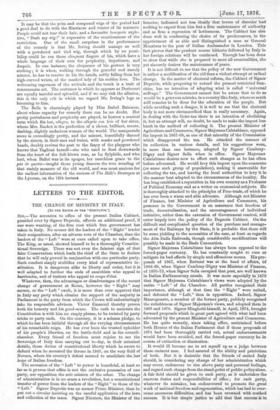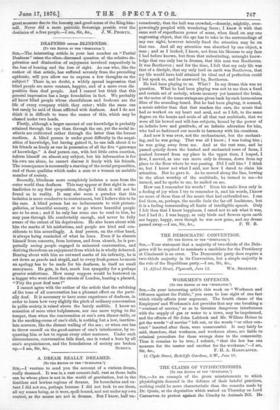LETTERS TO THE EDITOR.
THE CHANGE OF MINISTRY IN ITALY.
[TO TH1 EDITOR OF TH1"SPECTATOR.']
Sin,—The accession to office of the present Italian Cabinet, presided over by Signor Depretis, affords an additional proof, if one were wanting, of the firm root which free government has taken in Italy. No sooner did the leaders of the " Right " tender their resignations, after an adverse vote of the Chamber, than the leaders of the " Left " were at once called upon to take office. The King, as usual, showed himself to be a thoroughly Constitu- tional Sovereign. There was not even the faintest sign of that false Conservatism which leads the chief of the State to declare that he will only govern in conjunction with one particular party. Such conduct simply stultifies every kind of representative in- stitution. It is dangerous alike to liberty and order, but it is well adapted to further the ends of anarchists who appeal to barricades, and of traitors who appeal to coups d'itat.
Whatever, then, the advantages or disadvantages of the recent change of government at Rome, however the " Right" may mourn, or the " Left " exult, it is more than ever apparent that in Italy any party which obtains the support of the majority in Parliament is the party from which the Crown will unhesitatingly take its responsible advisers. Victor Emanuel thereby proves both his honesty and his good-sense. The oath to maintain the Constitution is with him no empty phrase, to be twisted by party tricks to party ends. On the contrary, it is a solemn pledge, to which he has been faithful through all the varying circumstances of his remarkable reign. He has ever been the trusted upholder of his people's liberties, on the battle-field and in the council- chamber. Every friend of freedom must rejoice to see the Sovereign of Italy thus carrying out to-day, in their minutest details, those duties of constitutional liberty which he swore to defend when he mounted the throne in 1849, on the very field of Novara, where his country's defeat seemed to annihilate the last hope of Italian freedom.
The accession of the " Left " to power is beneficial, at least so far as it proves that office is not the exclusive possession of one party, nor opposition the sole mission of the other. The change of administration is in no sense a revolution, but a constitutional transfer of power from the leaders of the "Right" to those of the "Left." Signor Depretis was no sooner Prime Minister, than he put out a circular insisting on the careful application of the laws and collection of the taxes. Signor Nicotera, the Minister of the Interior, indicated not less clearly that lovers of disorder had nothing to expect from him but a firm maintenance of authority and as firm a repression of lawlessness. The Cabinet has also done well in confirming the choice of its predecessors, in the appointment of so able and 'distinguished a man as General Menabrea to the post of Italian Ambassador in London. This fact proves that the prudent course hitherto followed by Italy in her foreign relations will be continued. Enough has been done to show that while she is prepared to meet all eventualities, she yet sincerely desires the maintenance of peace.
It is not difficult to see that the policy of the new Government is rather a modification of the old than a violent attempt at radical change. In the matter of electoral reform, the. Cabinet of Signor Depretis, while proposing to extend the present restricted fran- chise, has no intention of adopting what is called " universal suffrage." The Government cannot but be aware that to do so would be a grievous mistake, in a country like Italy, where so much still remains to be done for the education of the people. But while avoiding such a danger, it is well to see that the electoral body is not more circumscribed than is really necessary. Again, in dealing with the Grist-tax there is no intention of abolishing it, but an attempt will, no doubt, be made to make the impost less harsh in the method of collecting it. The present Minister of Agriculture and Commerce, Signor Majorana Calatabiano, opposed the impost in 1867-68, as one of that minority of the Commission which disapproved the tax. He attacked the manner of its collection in various details, and his suggestions were, in more than one instance, adopted by Signor Cambray- Digny and Signor Sella when in office. Signor Majorano Calatabiano desires now to effect such changes as he has often before advocated. He would levy this impost upon the commune (or some such group of population), making it answerable for collecting the tax, and leaving the local authorities to levy it in the manner best adapted to the circumstances of the locality. He has long established a reputation in his own country as a Professor of Political Economy and as a writer on economical subjects. He is thoroughly attached to the principles of Free-trade, of which he has ever been a warm and able advocate. Although not Minister of Finance, but Minister of Agriculture and Commerce, his presence in the Government is an assurance that freedom of trade, decentralisation, and the encouragement of individual initiative, rather than the extension of Government control, will enter largely into the policy of the Depretis Cabinet. On the difficult and complicated question of the purchase and manage- ment of the Railways by the State, it is probable that there will be some yielding to the necessities of the case, at least as regards the Alta Italia Railroads, though considerable modifications will possibly be made in the Basle Convention.
Signor Majorana Calatabiano has always been opposed to the forced-paper currency. He has constantly sought to cure or mitigate its bad effects by simple and efficacious means. His pro- posals of 1867, when Rattazzi was at the head of affairs, of 1868-69, when Signor Cambray-Digny was Minister of Finance,. of 1870-73, when Signor Sella occupied that post, are well known in Italian Parliamentary annals. It was more especially in 1874 that Signor Majorana Calatabiano's views were adopted by the entire " Left" of the Chamber. All parties recognised their importance, although at that time the " Right" were united, and defeated the "Left," then in opposition. Indeed, Signor Maurogonato, a member of the former party, publicly recognised the suitableness of Signor Majorana's views, and adopted them in 1869 and 1870. Signor Minghetti himself, in April, 1874, brought forward proposals which in great part agreed with what had been advocated by the present Minister of Agriculture and Commerce. He has quite recently, since taking office, maintained before both Houses of the Italian Parliament that if those proposals of 1874 had been thoroughly carried out, actual embarrassments- would have been avoided, and the forced-paper currency be in course of extinction or diminution.
It would ill become me to set myself up as a judge between these eminent men. I feel assured of the ability and patriotism of both. But it is desirable that the friends of united Italy should, in considering any change of her administration which may occur, endeavour to rise above party and personal feelings, and regard such change from the stand-point of public policy alone. A fair field should be given to each party, as it undertakes the onerous duties and responsibilities of office ; for each party, whatever its mistakes, has endeavoured to promote the great work of national freedom and regeneration, which has had to over- come enormous difficulties, and has been crowned with marked success. It is but simple justice to add that that success is in great measure due to the honesty and good-sense of the King him- self. Never did a more patriotic Sovereign preside over the destinies- of a free people.—I am, Sir, &c., J. W. PRORTN.



































 Previous page
Previous page